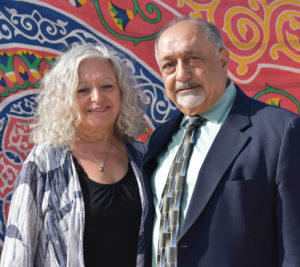By Muna Hishmeh
Basem Labib Hishmeh was born in Jerusalem on June 8, 1941, to Labib and Frida Hishmeh. Raised in Ramallah along with his three siblings Isam, Salwa, and Marwan, Basem was 15 years old when he and his family emigrated to the United States. Church members in Cleveland, Ohio, sponsored the family. These strangers helped the Hishmeh’s find housing, jobs, and schools and adjust to life in their new country.

Basem soon learned the impact of supporting each other. One of the families that had sponsored the Hishmeh’s helped Basem receive a scholarship to a private school for boys. For a year-and-a-half he lived with this family during the week and went home only on weekends. Having graduated from high school, he managed to get a full scholarship to attend Case Institute of Technology in Cleveland, Ohio. Four years later, he graduated with a degree in mechanical engineering.
Shortly after he had taken on his first position, working for Bailey Meter in Cleveland, Basem met Muna Shami, the daughter of Yousef and Naimeh Shami from Ramallah who had emigrated to Cleveland, Ohio, a few years after 1948. Two years after they met, Basem and Muna were married.
Basem was quite a success, taking on various positions in different departments and studying towards an MBA degree at night. By then, Basem and Muna had two children, Amal and Robert. When Basem started to work in the international department, he began to tinker with the idea of working overseas. He eventually accepted a job in Saudi Arabia and packed up his family to accompany him. In his new position of general manager at a company that manufactured floor tiles, Basem was extremely successful. The children attended the American International School together with children from 36 different countries, and the family traveled all over the world, gaining many experiences and meeting new people wherever they visited.
Nevertheless, when after five and a half years in Saudi Arabia, Basem was presented with the opportunity to buy into a manufacturing company in New Jersey, he immediately accepted, and eventually he and his family moved back to the United States. Manufacturing water heaters and boilers for commercial buildings, Basem employed around 125 persons in New Jersey and circa 100 representatives around the country and worldwide.
After having owned and run the company for 25 years, Basem and Muna decided to sell it. As discussions regarding the sale were underway, they developed the idea to start a foundation, knowing that they had to help others as they had been helped as immigrants. Thus, the Muna and Basem Hishmeh Foundation was established with the aim of helping children gain exposure to the arts. Organizations in the United States and in Palestine that give underprivileged children the opportunity to learn all forms of the arts receive funds through this foundation. (For more information, please visit
www.thehishmehfoundation.org.)
When during twice-yearly trips to Palestine, Muna and Basem noticed that there was a shortage of playgrounds, they met with Hashim Shawa, Bank of Palestine’s chairman of the board, and decided to build playgrounds in a joint project titled Al-Bayyara (Orange Orchard). Shortly after, other organizations joined in, and bayyarat are now being built all over Palestine.
In Nisf Jbail, the village of Muna’s father, a community center was built, the little church in the village was restored, and 1,200 olive trees and about 200 fruit trees were planted in the nearby city of Beit Imreen, making a crucial contribution to the reforestation of Palestine. In October 2019, the first olives were harvested and the olive oil was shipped to New Jersey.
Because he strongly believes in paying back to his home country, Basem is currently involved in a number of development projects in Palestine, helping local people and supporting the economy.
In March 2019, ACCESS of Dearborn, Michigan, honored Muna and Basem with the ACCESS Arab Americans of the Year Award.

